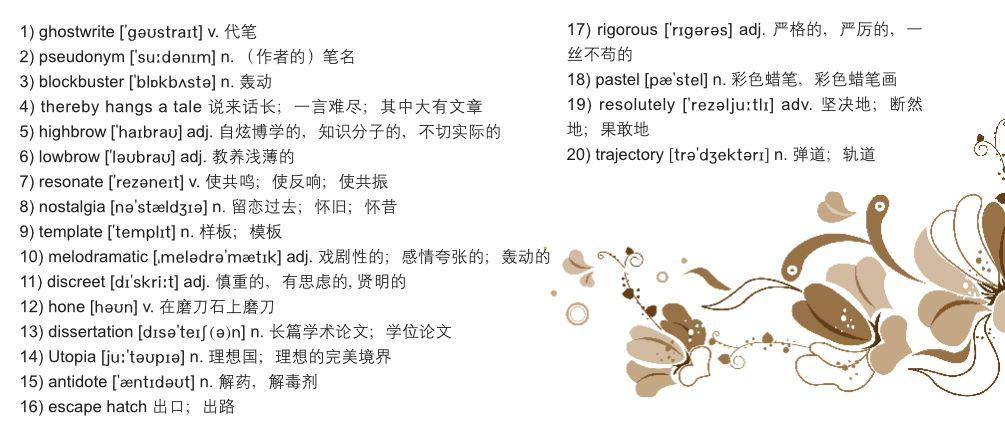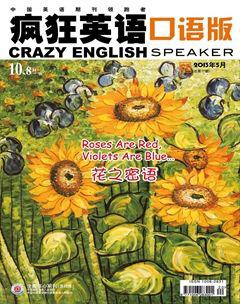《甜蜜谷》代笔人的双角色生活

Host: And now, we turn to 1)ghostwriting. While in her 20s, Boston College English professor Amy Boesky lived a double life. She was working at a publishing company, wondering what she wanted to do with the rest of her life when she get a chance to write for the popular teen series“Sweet Valley High.” At first, Boesky thought shed write for pay for just a short time. But over the next six years, she was a struggling graduate student by day and a ghostwriter by night. Her professors knew her as Amy Boesky, but her readers knew her by her 2)pseudonym, Kate William. So this all began one night at a dinner party, as I understand it. Tell us about that.
Amy Boesky: Thats right. I had come to dinner with a friend of my fathers who was a childrens book author. She knew I was trying to publish a childrens book myself. And a friend-of-a-friend was there that evening, Francine Pascal, who had created, the previous year, what was turning out to be a 3)blockbuster, best-selling serial set of stories about the Wakefield twins, Elizabeth and Jessica, who were similar—identical in appearance, but were very different in personality. And somebody suggested that maybe I try out to write for the series. I did. I enjoyed it enormously, and I found myself getting hooked.
Host: And 4)thereby hangs a tale. Had you ever heard of the“Sweet Valley High” series before that?
Boesky: No, I hadnt. I had just finished doing an M.Phil. in 17th century British literature at Oxford. I was working as an editorial assistant and—though I grew up on the Nancy Drew mysteries, so, I, you know, Id certainly known about such ghostwritten fiction myself as a reader, I didnt know these books until—and in some sense, as I think in the process of writing them, I was also reading them with great pleasure.
Host: Now, you were studying John Dunn, am I right? Is that right?
Boesky: I was studying, essentially, all the literature of the 17th century that was—British 17th century that was not the drama—so, yes, Dunn, Milton, etc.
Host: So you were going from very 5)highbrow to kind of 6)lowbrow, we might say. Now, did you have to—you said you had—did you have to kind of try out for the job? How did you go about getting the job in the first place?
Boesky: I did. There was a tryout. You wrote a chapter and a—you wrote one chapter, and you wrote a chapter outline. And I discovered that the voices of these girls, not only Jessica and Elizabeth, but their friends, 7)resonated with my own, I suppose, 8)nostalgia, at that point, as a 23-year-old, for my own high school experience. And I found it enormously fun to write.
Host: So did you get to come up with the plot, the dramatic plot? Was that what you got to do? I mean, Im certain you had to follow a certain 9)template for part of it.
Boesky: We had. We—so ghostwriters—and I was—for the five or six years that I wrote for the series, it was mostly myself, and I was alternating with another ghostwriter. We would receive plot outlines that looked a little bit like freeverse poems. They were eight or nine pages long. And then I would devise a subplot. And I often tried to think about balancing the main plot, so something that was lighter if the main plot was 10)melodramatic, etc.
Host: Did you find that, Amy, did you find that having to write—ghostwrite according to a sort of template sometimes did help your skills, in a way?
Boesky: Well, its interesting. I think, you know, ghostwriting is much more widespread than some people realize. And,you know, theres the famous example, the Nancy Drew, the Hardy Boys, etc. You know, theres the Kate Fansler mysteries that were written by an English professor, Carolyn Heilbrun at Columbia. So its, you know, its kind of a widespread phenomenon. I think people do it for lots of different reasons. For me, it was a 11)discreet period in my 20s.
There can be a way of sharpening and 12)honing your skills as youre trying to kind of find your voice. People ghostwrite for money—that can be very helpful—and for gratification and pleasure. And I think for the period in which I was writing these books, it was all of those, absolutely.
Host: So you were writing your 13)dissertation at the same time that you were writing “Sweet Valley High” books?
Boesky: I was. And actually, it was on 14)Utopias of the 17th century. And, you know, I was thinking about that, and in some ways, theres no question that the world of Sweet Valley was this—I mean, it was a very 1980s, Reagan-era, suburban utopia. But it was a utopia of sorts. And maybe in some ways, it also helped me.
It was a kind of—I talk about it in the essay that I just wrote about this recently as being a sort of 15)antidote, a kind of 16)escape hatch from the more, kind of, 17)rigorous world of scholarship and academia in which I was living. But I think maybe it did help, in some ways, for me to theorize what these idealized places are that were so drawn to.
Host: Did you think that it would work against you in some way if your dissertation committee had found out? I mean, were you really worried about that, that were in the academic life, that they would—I dont know—that it would affect you negatively somehow if they knew?
Boesky: You know what? Its very interesting. I wrote—in the essay I just wrote about this, I talk about the fact that my—one of my advisers was talking about ghostwriting and Shakespeare. And, at the time, I was reading theory, Foucault and Bakhtin, and kind of trying to understand what we mean by the author function. And so, you know, at a theoretical level, I think that all of this was very interesting, and I dont think theyd mind at all now. But when youre sort of in the trenches working on scholarship, I dont know how they would felt about it then.
But, you know, I think there was a guilty pleasure for me, and you talked about the kind of high-low culture aspect,and I was very, very aware of that—I mean, these books with their 18)pastel covers and their—they were so 19)resolutely light.
Host: Amy, it sounds to me like ghostwriting was a pretty good experience for you. What made you give it up, eventually?
Boesky: You know, thats why I wrote this essay, because its interesting. Theres the writing of these books, which happened a long way back for me. And then I recently wrote this essay called “The Ghost Writes Back.” And it was about that question, which was: Why were they so compelling, and why finally did I stop? You know, for me, there was a really kind of fairly neat 20)trajectory that the span of time in which I was pursuing my doctorate, that was the time in which I was writing these books.
And I think there were a lot of ways—a lot of things ended. The 80s were ending. My doctorate program was ending. I took my first job. I was moving down to Georgetown to teach. And you know what? Its—I suppose like this happens with many people when theyre—theres a sort of voice inside you that says, you know, its time. This has been a good experience, but its enough now.
And I think for me, it really had a lot to do with what Ive talked about as moving into writing under my own name, which is such a funny concept, in a way, but it became—and I suppose its sort of part of—for me, anyway—it was working through my 20s and sort of figuring out the kind of writing that I wanted to do. But it just became increasingly clear that, for me, that was the sort of—the path I needed to take.
主持人:我们现在来谈谈代笔写作。波士顿学院英文教授埃米·伯斯基在她二十几岁的时候过着双角色的生活。她当时正在出版公司工作,正考虑接下来的职业生涯要干什么的时候,她得到一个为青少年流行系列《甜蜜谷》写稿的机会。刚开始,伯斯基认为只是短期内为了报酬而写。然而,在接下来的六年多,她白天是努力学习的研究生,晚上是代笔写稿的作者。她的教授知道她名叫埃米·伯斯基,而她的读者只认识她的笔名——凯特·威廉姆。据我所知,这一切源于一次晚餐的聚会。告诉我们有关情况吧。
埃米·伯斯基:没错。我跟我爸爸的一位朋友去吃饭,她是一本儿童书的作者,她知道我正在努力自己出版一本儿童书。那天晚上朋友的朋友——弗朗辛·帕斯卡尔也在场,他在上一年创作了关于韦克菲尔德双胞胎——伊丽莎白和杰西卡的畅销系列小说,结果引起了一番轰动。这对双胞胎外表相像,但是性格迥异。当中有人建议我可以去试试为该系列写稿。我做到了,而且非常乐在其中,我发现自己被吸引住了。
主持人:这其中大有文章,在之前你听说过《甜蜜谷》的系列小说吗?
伯斯基:没听过。我刚在牛津大学修完十七世纪英国文学的哲学硕士学位,并且是一名编辑助理。我是看《少女妙探》侦探片长大的,所以作为一名读者,我自己当然了解这种代笔小说。我想在某种程度上,我并不了解这些书,直到我在写稿的过程中,同时我也会带着非常愉悦的心情去阅读。
主持人:你当时正在研究约翰·邓恩,我说得对吗?对吗?
伯斯基:基本上,我当时正在研究十七世纪的所有文学,英国十七世纪不仅仅只有戏剧,所以是的,包括约翰·邓恩、约翰·弥尔顿等等。(译者注:约翰·邓恩是十七世纪英国玄学派诗人,约翰·弥尔顿是英国诗人、政论家和民主斗士。)
主持人:于是我们会说,你是从高深的学术研究到浅显通俗的领域。你说过得到这份工作必须要通过选拔。从一开始你是怎样得到这份工作的?
伯斯基:是的,我要通过选拔。你要写一个篇章,要写一个篇章的概要。于是我发现女孩们的心声,不仅仅是伊丽莎白和杰西卡,还有她们的朋友,跟我很有共鸣。作为一个23岁的女孩,我想在那点上是在缅怀我自己的高中生活吧,而且我发现写起来非常有趣。
主持人:那么一开始你要想出那些跌宕起伏的剧情吗?那是你要做的吗?我的意思是,我肯定你必须要遵循一定的模式去写你那部分。
伯斯基:是的,我们这些代笔作者要这样做。我为该系列写了五六年,主要是我自己,还和其他代笔作者轮流写。我们会收到看起来有点像自由体诗的剧情概要,大概八或九页长。我会设计一个分剧情,去努力平衡主剧情。因为如果主剧情太跌宕起伏,分剧情就可以让它缓冲一些,诸如此类。
主持人:埃米,你有没发现在某种程度上,遵循一种模式去写作或代笔写作有时确实提高了你的写作技巧?
伯斯基:嗯,很有趣。我想代笔写作比人们意识到的更普遍。你知道的,很著名的例子有《少女妙探》、《哈迪男孩》等等。凯特·凡斯勒系列侦探小说是由哥伦比亚的英文教授卡罗琳·赫尔布伦所写。所以你知道代笔写作是种很普遍的现象。我想人们为了很多不同的原因代笔,对于我,这是我20几岁中一段很谨慎的时期。
那是一种能够磨练技巧的方式,因为你正在试图寻找你的心声。人们代笔无论是为了金钱,还是为了满足感和愉悦感,这项工作都大有帮助。我认为在给这些书代笔的过程中,完全包含了所有这些因素。
主持人:那么你在写《甜蜜谷》系列书的同时也在写毕业论文吗?
伯斯基:我当时是。事实上我正沉迷在十七世纪的理想世界里。我在想,在某些方面,甜蜜谷的世界毫无疑问也可以是这样的。我的意思是,甜蜜谷的世界是二十世纪八十年代,里根年代的理想郊外生活。它们同样是理想世界的类型。在某些方面,它也是帮了我的。
我在最近写的一篇文章中谈到,那是我从现实生活里更加严苛的学位和学术世界中逃离的一种解药、一种出口。但我认为它在某些方面确实帮了我,使我能够把这些吸引我们的理想地方理论化。
主持人:如果你的论文委员会发现了,你认为在某种程度上,这将对你不利吗?我的意思是,你有真的担心过,在学术生活里,他们会——我不知道会怎样——如果他们发现了,那会对你有负面影响吗?
伯斯基:你知道吗?很有趣。我刚在一篇文章写过这些,我谈到一个事实:我的其中一位指导老师谈到代笔写作和莎士比亚。而那时我在读福柯和巴赫金的理论,(译者注:米歇尔·福柯是法国哲学家和思想系统的历史学家。巴赫金是前苏联著名文艺学家、文艺理论家和批评家。)正在努力理解我们所说的作者功能的涵义。而且你知道,在理论层面上,我想这些都是非常有趣的,我认为他们一点都不介意。但如果我们同在为奖学金一起奋斗的时候,我不知道他们会有什么感觉。
但是你知道,我认为我有一种内疚的快感,当你说到高级低俗文化方面,我清晰地意识到。我的意思是,这些书有着色彩缤纷的封面,它们是如此的明亮轻快。
主持人:埃米,看来代笔对你来说是非常好的经验,什么东西让你最终放弃了它?
伯斯基:你知道,那就是我写这篇文章的原因,因为那太有趣了。正是因为写这些书,让我对自己有一段很长的回忆。于是我最近写了这篇文章,名叫《代笔人回归》,文中解答了这些问题:为什么这些系列书那么引人入胜?为什么我最终放弃写下去?对于我,那真是相当巧妙的人生轨迹,那段时间我正攻读博士学位,也是那段时间我写了这些书。
我想有很多方式,有很多事情要完结,二十世纪八十年代要过去,我的博士学位要完成。我找到第一份工作,搬到乔治镇去任教。你知道吗?我想就像发生在很多人身上一样,你的内心有种声音说,是时候了。这是一种很好的经历,但现在是时候(结束)了。
而且我认为对于我,那真的跟我已经谈到的转向以我自己的名字写作有莫大的关系,那是种很有趣的概念。在某种程度上,我想代笔已经变成我的一部分,贯穿我20几岁的年华,让我考虑清楚我想写的作品类型。但它越来越清晰地让我知道,那是我需要走的路。

